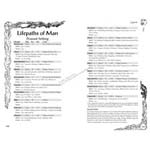Introduction 
Most Hârnic lifepath trajectories (at least for humans) can be established with the Lifepaths of Man pages from Burning Wheel Gold.
However, there are some areas where customization may help reflect the background experiences or professional knowledge, that some Hârnic characters may have.
This section of the site suggests how to use BWG lifepaths for Hârnic character creation, with particular attention to using the Lifepaths of Man for guilds, churches, and cultural/regional groups unique to Hârn.
There are also pages on using Burning Wheel's Elven and Dwarven lifepaths for the Sindarin and Khuzdul.
Lifepath Settings and Hârn
Burning Wheel lifepaths are grouped into settings (and sub-settings) that represent the various range of possibilities open to characters within a given social context. Examples include Peasant Setting, City Setting, Military Setting, Church Setting, and so on.
These settings map out neatly onto Hârn's social structure— at least for the civilized human kingdoms of southern Hârn:
- The Peasant Setting is appropriate
for serfs, free farmers, herdsmen, fishermen/trappers, and other rural
village-dwellers engaged in food production.
- The Villager Setting can be used for inhabitants
of rural villages engaged in skilled craft (both guilded and unguilded)
or other non-agricultural activities (guards, etc.) It may also be appropriate
for using in connection for Hârn's smaller towns (e.g. Shostim, Olokand,
Gythrun).
- The City Dweller Setting reflects the social
opportunities in Hârn's major cities (Coranan, Cherafir, Golotha, etc.)
for guilded and un-guilded characters alike. It may also be appropriate
for Hârn's smaller towns.
- The Noble Setting is for
Hârnians of gentle birth and Thardic patrician greatclans.
- The Noble
Court Subsetting reflects life social possibilities
for both Hârnic nobles (or Thardic patricians) and commoners in the
employ of a noble.
- The Religious Subsetting works reasonably
well for representing opportunities in Hârn's various churches, although
some flexibility and tinkering may be desirable to reflect
the nature of different churches. Please see the page on Church-specific
lifepaths for specific ideas.
- The Professional Soldier Subsetting can
be used to represent opportunities not only in formal military institutions
(e.g. Tharda's legions, Kaldor's Chelmarch and Oselmarch armies, fighting
orders), but also in mercenary companies and other quasi-military organizations.
It may also be appropriate to use this setting (at least for a lifepath
or two) to reflect the feudal service owed by yeomen, or to reflect participation
in a rural/village militia.
- The Seafarer Setting would, of course, be
for those who live by— and on— the sea.
- The Servitude/Captive Setting would be for
slaves, prisoners, and the like. It might be possible to also use this
subsetting for serfs and other bondsmen.
- The Outcast Sub-Setting would include those
who live on the edge/margins of society and/or the laws.